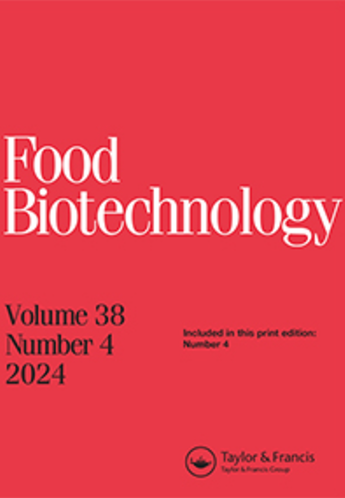Prebiotic potential of Puçá and Gabiroba fruit by-products from Cerrado Savannah
IF 1.6
4区 农林科学
Q4 BIOTECHNOLOGY & APPLIED MICROBIOLOGY
引用次数: 0
Abstract
ABSTRACT This study investigated the prebiotic potential of by-products from Puçá (Mouriri elliptica Mart) and Gabiroba (Campomanesia adamantium (Cambess.) O. Berg) (PBP and GBP). The fermentative capacity of Lactobacillus acidophilus LA-05, Lacticaseibacillus casei L-26, and Bifidobacterium animalis subsp. lactis BB-12 was evaluated on PBP and GBP extracts. Their prebiotic activity scores were evaluated in the presence of two strains of Escherichia coli. PBP and GBP contain high levels of dietary fiber and significant content of phenolic compounds such as catechin and procyanidin B2. Probiotic cultivation in media with PBP and GBP showed increased bacterial counts and decreased pH values. Positive probiotic activity scores were found for all strains, such as increased production of short-chain fatty acids and consumption of glucose and fructose over time, indicating high metabolic activities. Therefore, the PBP and GBP have characteristics that indicate their prebiotic potential, and potentially are interesting components to increase the nutritional value of foods.Cerrado Savannah Puçá和Gabiroba水果副产品的益生潜能
摘要本研究调查了Puçá(Mouriri elliptica Mart)和Gabiroba(Campomanesia adamantium(Cambess.)O.Berg)(PBP和GBP)副产物的益生元潜力。嗜酸乳杆菌LA-05、干酪乳杆菌L-26和动物双歧杆菌亚种的发酵能力。在PBP和GBP提取物上评价了乳酸菌BB-12。他们的益生元活性评分是在两株大肠杆菌存在的情况下进行评估的。PBP和GBP含有高水平的膳食纤维和显著含量的酚类化合物,如儿茶素和原花青素B2。在含有PBP和GBP的培养基中培养益生菌显示出细菌计数增加和pH值降低。所有菌株的益生菌活性得分均为阳性,如随着时间的推移,短链脂肪酸的产生以及葡萄糖和果糖的消耗增加,表明代谢活性较高。因此,PBP和GBP具有表明其益生元潜力的特征,并且可能是增加食物营养价值的有趣成分。
本文章由计算机程序翻译,如有差异,请以英文原文为准。
求助全文
约1分钟内获得全文
求助全文
来源期刊

Food Biotechnology
工程技术-生物工程与应用微生物
CiteScore
3.80
自引率
0.00%
发文量
15
审稿时长
>12 weeks
期刊介绍:
Food Biotechnology is an international, peer-reviewed journal that is focused on current and emerging developments and applications of modern genetics, enzymatic, metabolic and systems-based biochemical processes in food and food-related biological systems. The goal is to help produce and improve foods, food ingredients, and functional foods at the processing stage and beyond agricultural production.
Other areas of strong interest are microbial and fermentation-based metabolic processing to improve foods, food microbiomes for health, metabolic basis for food ingredients with health benefits, molecular and metabolic approaches to functional foods, and biochemical processes for food waste remediation. In addition, articles addressing the topics of modern molecular, metabolic and biochemical approaches to improving food safety and quality are also published.
Researchers in agriculture, food science and nutrition, including food and biotechnology consultants around the world will benefit from the research published in Food Biotechnology. The published research and reviews can be utilized to further educational and research programs and may also be applied to food quality and value added processing challenges, which are continuously evolving and expanding based upon the peer reviewed research conducted and published in the journal.
 求助内容:
求助内容: 应助结果提醒方式:
应助结果提醒方式:


